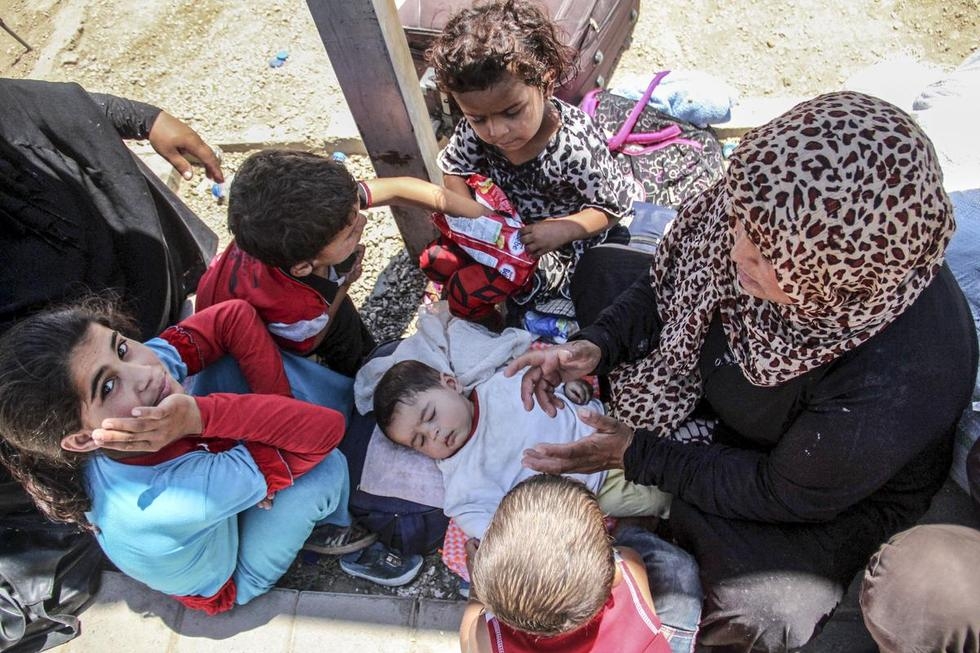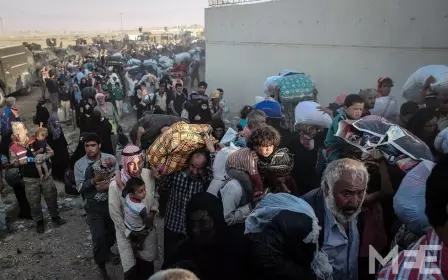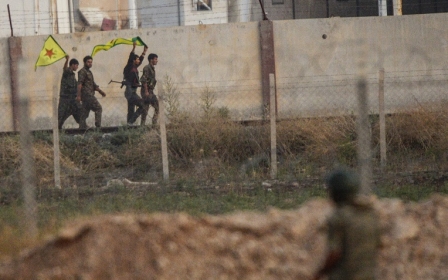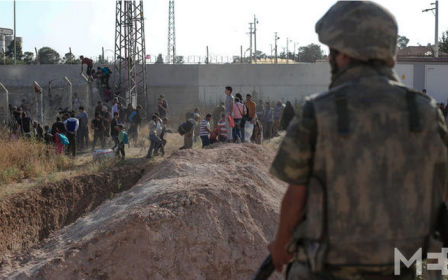Syrian refugees struggle to return to Tal Abyad

Refugees seeking to return to the Syrian town of Tal Abyad after fleeing fighting there last week were stuck on the Turkish side of the border amid conflicting accounts over who closed the frontier.
Turkish authorities said refugees were not able to cross because Kurdish People's Protection Units (YPG) militia had closed the gate on the other side of the border.
But the YPG, who now control Tal Abyad, denied they were responsible for the border closure.
"From our point of view, the border is open... It's the Turks who closed the border from their side," YPG spokesman Redur Khali told AFP in Beirut, adding that people were continuing to return through unofficial crossing points.
Earlier this week the YPG – backed by Free Syrian Army rebels and US-led airstrikes - ousted Islamic State (IS) militants from Tal Abyad after fighting that prompted some 23,000 Syrian refugees to flee into Turkey.
"If the Turkish government did not open the doors to us, we would have died in Syria," Ali Berho, a 48-year-old Syrian civil servant, told Anadolu Agency. "No other country has done the same thing for us."
Hundreds of Syrians returned home on Wednesday as calm returned to their hometown. But on Thursday some 200 others were unable to cross the border.
A Turkish official told AFP that while a total of 1,000 Syrians had returned home on Wednesday across the border, the YPG was not allowing any crossing on Thursday.
"The Turkish side has no objections" to opening the border, the official stressed.
"We haven't closed the gate, but YPG has not been allowing anyone in as of today," added the official.
US: 'unacceptable' if Kurds displacing local Syrians
The refugees said they had been told the border would not open until Monday, meaning they will miss celebrating the start of the holy fasting month of Ramadan at home.
"Today we came to the gate hoping we can cross into Tal Abyad, I have been waiting since 7am in the morning but they are not letting us in," said Emine, 60.
"If they have some mercy, they let us go back to our home. It's Ramadan for god's sake!"
YPG spokesman Redur Khali said that "life is normal today in Tal Abyad. We are continuing to check houses that we did not enter yet and looking for unexploded mines."
The Pentagon said on Tuesday that it is "unacceptable" if Syrian Kurdish fighters push Arabs and Turkmens out of their lands, following accusations of "ethnic cleansing" in a number of towns following their liberation from IS.
"We certainly have seen these reports, and it is something that we are watching for," said Pentagon spokesman Col Steve Warren. "Without question it is something that we'll find out unacceptable, if true."
Turkey, which has taken in some 1.8 million Syrian refugees since the conflict started in 2011, has repeatedly complained that it has been left to shoulder an unfair burden.
According to government figures, Turkey has spent more than $6 billion so far for refugees while the international community's help has amounted to $300 million.
But it has also faced accusations itself of letting IS fighters cross back and forth across its borders, accusations Ankara vehemently denies.
UN: Turkey hosts largest number of refugees in world
Turkish President Recep Tayyip Erdogan late Wednesday held an unannounced meeting in Ankara with top officials, including Foreign Minister Mevlut Cavusoglu and the head of Turkey's emergency aid agency Fuat Oktay, about the Syria crisis.
They discussed the latest influx of migrants into Turkey but no more details were released, the official Anatolia news agency reported.
According to the UN High Commissioner for Refugees, Turkey shelters the largest number of refugees in the world but gets very little support from other countries.
"We estimate more than two million refugees are today in Turkey. Turkey very generously opened its borders to such a large number of Syrians, Iraqis and Afghans," Antonio Guterres said during a launch of the UN agency’s 2014 Global Trends report in Istanbul.
"That has a special meaning in a world where so many borders are closed or restricted and new walls are built," Guterres said.
The report claims that Syria is “the world’s biggest producer of both internally displaced people (7.6 million) and refugees (3.88 million at the end of 2014).”
In contrast to perceptions that refugees from African or Middle Eastern countries flee into the developed world, Guterres revealed that 86 percent of refuges are actually in the developing world.
Middle East Eye propose une couverture et une analyse indépendantes et incomparables du Moyen-Orient, de l’Afrique du Nord et d’autres régions du monde. Pour en savoir plus sur la reprise de ce contenu et les frais qui s’appliquent, veuillez remplir ce formulaire [en anglais]. Pour en savoir plus sur MEE, cliquez ici [en anglais].




